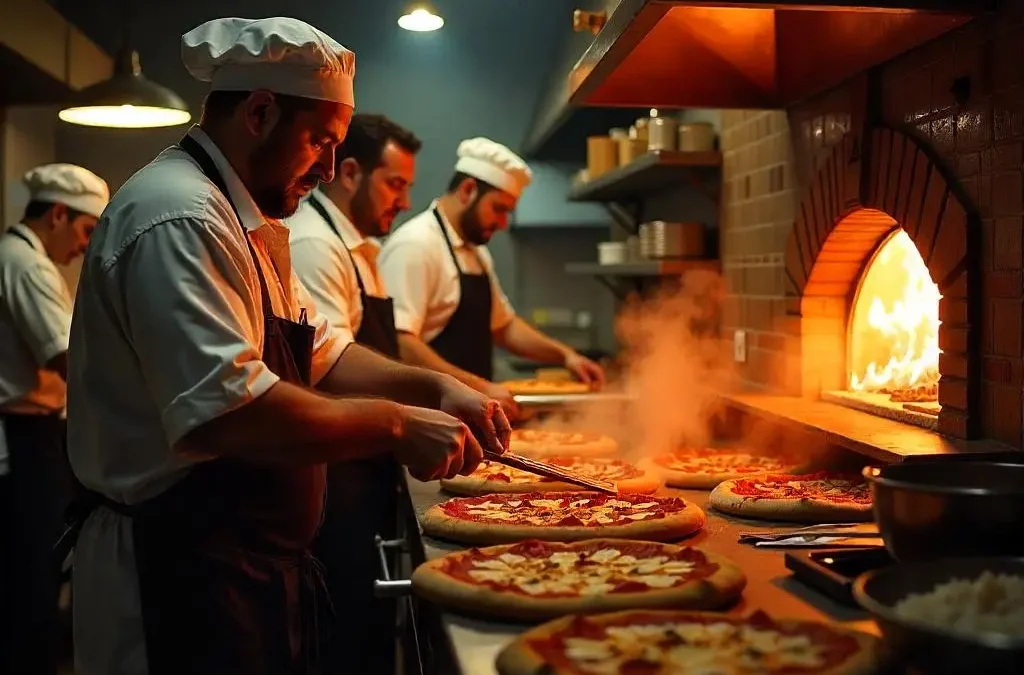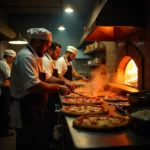Opening a pizzeria or upgrading your existing kitchen requires careful consideration of the key essentials that turn dough and toppings into the beloved pie. When it comes to crafting the perfect slice, the quality, efficiency, and reliability of your equipment can make a significant difference. Below, we’ll delve into the essential tools and machinery that top pizzerias rely on to deliver mouth-watering pizzas time and again.
Essential Equipment for Your Pizza Kitchen: Crafting the Perfect Slice
Every pizza kitchen starts with a solid foundation of essential tools. The hero in this lineup is undoubtedly the commercial pizza oven, the engine room of any pizza-making operation. But beyond the oven, your kitchen should be equipped with a sturdy dough press or sheeter to create uniform bases, and a variety of pizza peels to safely transport pizzas to and from the inferno.
Quality matters when it comes to pizza pans and screens. Selecting the right size, shape, and material can impact the cooking results significantly, ensuring even heat distribution and the desired crispiness of the crust. From traditional deck ovens to modern conveyor styles, choosing the right machinery ensures consistency and keeps pace with customer demand.
Accessories like dough boxes for storage and proper fermentation, as well as portion scales to maintain consistent sizes and costs, are also vital components. To ensure your toppings are always fresh and within reach, you’ll want to look into an Atosa pizza prep table, combining cold storage with a convenient work surface for assembly.
Commercial Pizza Ovens: Types and Tips for Selection
Commercial pizza ovens come in several types, each suited to different restaurant sizes, budgets, and styles of pizza. Deck ovens create a traditional taste and are prized for their stone cooking surfaces, while conveyor ovens are heralded for their ease of use and consistency, making them ideal for higher volume establishments. Convection ovens, on the other hand, can be a cost-effective solution that still yields a great product.
The key factors when selecting an oven include space limitations, desired production capacity, energy efficiency, and the type of pizza on your menu. For example, a Neapolitan pizzeria will require a different oven type than a New York-style pizza joint. Personal preference and the skill level of your staff can also weigh heavily on this decision.
The Importance of a High-Quality Dough Mixer in Pizza Making
The backbone of any pizza kitchen is the dough, which requires a high-quality mixer for the right texture and flavor. These mixers come in various sizes and capabilities, so it’s crucial to select one that meets your kitchen’s demand without overworking the machine. The best mixers are durable, easy to clean, and have settings and attachments that allow for precision kneading.
A commercial-grade mixer is a significant investment, one that can directly impact the quality and consistency of your pizza dough. Mixers that come equipped with a dough hook can simulate hand kneading, providing an even distribution of ingredients and air for that perfect rise. The speed settings are also vital, as different dough types may require different mixing speeds.
Investing in a mixer with a proper capacity can also prevent costly delays during busy periods. A machine that’s too small requires batch after batch, while one that’s too large can make dough management cumbersome. Forecasting expected volume and analyzing your space constraints will guide you to the right mixer for your business.
Pizza Serving Supplies: Plates, Cutters, and Delivery Essentials
After the pizza is perfectly baked, the next step is getting it to the table or the customer’s door, looking and tasting its best. This requires a whole set of supplies specifically designed for pizza serving. Sturdy pizza plates, essential for dine-in services, should resist heat and cuts, and ideally stack neatly for storage.
Pizza cutters are another critical tool, and they come in different styles, such as wheel cutters or rocking blades. Choose what works best for your kitchen based on ease of use, the type of pizzas you’re serving, and durability. A smooth and sharp cutting experience prevents the toppings from being dragged across the pizza, ensuring a beautiful presentation.
For delivery or takeout services, the emphasis is on maintaining the pizza’s temperature and appearance. Insulated delivery bags are necessary to keep pizzas hot as they travel from your kitchen to the customer. Sturdy carryout boxes that prevent grease leaks and preserve the integrity of the crust are equally essential.
Altogether, the right equipment is a vital component of any pizza kitchen’s success. By focusing on quality and efficiency across ovens, mixers, prep tables, and serving supplies, pizzerias can meet the high standards of today’s pizza lovers while streamlining their operations for maximum profitability.
















